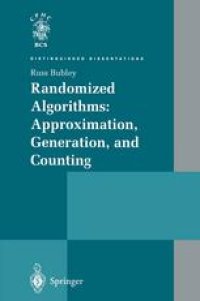
Ebook: Randomized Algorithms: Approximation, Generation and Counting
Author: Russ Bubley MA PhD (auth.)
- Genre: Mathematics // Algorithms and Data Structures
- Tags: Algorithm Analysis and Problem Complexity, Math Applications in Computer Science, Symbolic and Algebraic Manipulation, Probability Theory and Stochastic Processes, Combinatorics
- Series: Distinguished Dissertations
- Year: 2001
- Publisher: Springer-Verlag London
- Edition: 1
- Language: English
- pdf
Randomized Algorithms discusses two problems of fine pedigree: counting and generation, both of which are of fundamental importance to discrete mathematics and probability. When asking questions like "How many are there?" and "What does it look like on average?" of families of combinatorial structures, answers are often difficult to find -- we can be blocked by seemingly intractable algorithms. Randomized Algorithms shows how to get around the problem of intractability with the Markov chain Monte Carlo method, as well as highlighting the method's natural limits. It uses the technique of coupling before introducing "path coupling" a new technique which radically simplifies and improves upon previous methods in the area.
Randomized Algorithms discusses two problems of fine pedigree: counting and generation, both of which are of fundamental importance to discrete mathematics and probability. When asking questions like "How many are there?" and "What does it look like on average?" of families of combinatorial structures, answers are often difficult to find -- we can be blocked by seemingly intractable algorithms. Randomized Algorithms shows how to get around the problem of intractability with the Markov chain Monte Carlo method, as well as highlighting the method's natural limits. It uses the technique of coupling before introducing "path coupling" a new technique which radically simplifies and improves upon previous methods in the area.
Randomized Algorithms discusses two problems of fine pedigree: counting and generation, both of which are of fundamental importance to discrete mathematics and probability. When asking questions like "How many are there?" and "What does it look like on average?" of families of combinatorial structures, answers are often difficult to find -- we can be blocked by seemingly intractable algorithms. Randomized Algorithms shows how to get around the problem of intractability with the Markov chain Monte Carlo method, as well as highlighting the method's natural limits. It uses the technique of coupling before introducing "path coupling" a new technique which radically simplifies and improves upon previous methods in the area.
Content:
Front Matter....Pages i-xix
Mathematical Background....Pages 1-11
Techniques for Sampling and Approximate Sampling....Pages 13-28
Approximate Counting....Pages 29-36
Applications: Coupling....Pages 37-82
Intermezzo....Pages 83-90
Applications: Path Coupling....Pages 91-118
Directions for Future Work....Pages 119-124
Back Matter....Pages 139-152
Randomized Algorithms discusses two problems of fine pedigree: counting and generation, both of which are of fundamental importance to discrete mathematics and probability. When asking questions like "How many are there?" and "What does it look like on average?" of families of combinatorial structures, answers are often difficult to find -- we can be blocked by seemingly intractable algorithms. Randomized Algorithms shows how to get around the problem of intractability with the Markov chain Monte Carlo method, as well as highlighting the method's natural limits. It uses the technique of coupling before introducing "path coupling" a new technique which radically simplifies and improves upon previous methods in the area.
Content:
Front Matter....Pages i-xix
Mathematical Background....Pages 1-11
Techniques for Sampling and Approximate Sampling....Pages 13-28
Approximate Counting....Pages 29-36
Applications: Coupling....Pages 37-82
Intermezzo....Pages 83-90
Applications: Path Coupling....Pages 91-118
Directions for Future Work....Pages 119-124
Back Matter....Pages 139-152
....
Download the book Randomized Algorithms: Approximation, Generation and Counting for free or read online
Continue reading on any device:

Last viewed books
Related books
{related-news}
Comments (0)